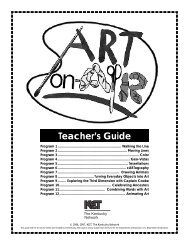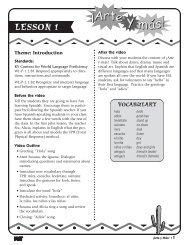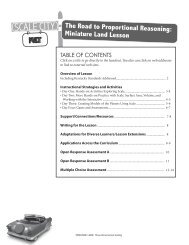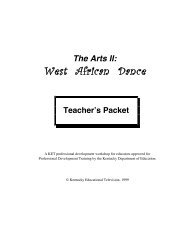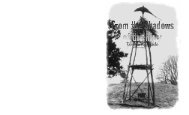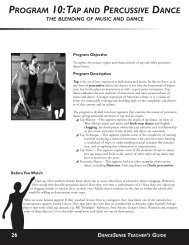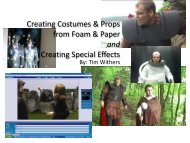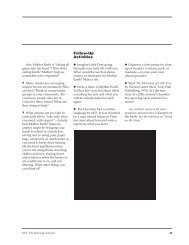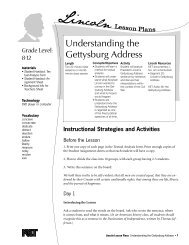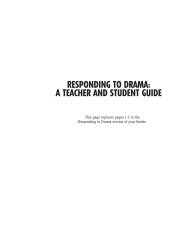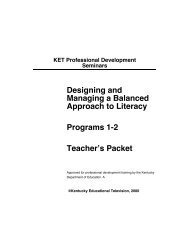7369 old music 2402 - KET
7369 old music 2402 - KET
7369 old music 2402 - KET
You also want an ePaper? Increase the reach of your titles
YUMPU automatically turns print PDFs into web optimized ePapers that Google loves.
songs have been recorded by the Falls<br />
City Ramblers; New Grass Revival;<br />
Old Louisville Express; and most<br />
recently the Buzzard Rock String Band,<br />
of which he is also a member.<br />
Through the years, the Gray Eagle<br />
Band has continued to favor the <strong>old</strong>er,<br />
traditional styles of country <strong>music</strong>. It is<br />
a love that has grown through personal<br />
association with the people, the places,<br />
and the ways of life that produced that<br />
<strong>music</strong>:<br />
“We have lived and worked in the<br />
kinds of small towns and rural communities<br />
where <strong>music</strong> comes to people as<br />
naturally as breathing. The <strong>music</strong> we<br />
have heard and learned along the way<br />
is <strong>music</strong> that grew out of the experience<br />
of the people who settled and built<br />
Kentucky. It is the <strong>music</strong> of real life:<br />
Every song or tune has a story behind<br />
it, and there are songs for every<br />
occasion life has to offer. It is <strong>music</strong><br />
that connects the generations and<br />
connects us to the place we live. And<br />
perhaps most important, unlike most of<br />
today’s <strong>music</strong>, it is accessible and at<br />
home in small informal gatherings on<br />
front porches, under shade trees, or in<br />
classrooms in a circle of kids. If the fun<br />
we’re having as pickers and singers<br />
sparks an interest on the part of any of<br />
those young people, we feel we have<br />
been well rewarded.”<br />
Bob and Susie Hutchison<br />
(Program 10)<br />
Mountain dulcimer performers Bob<br />
and Susie Hutchison of Frankfort, KY<br />
have enjoyed sharing <strong>music</strong> with<br />
audiences since their first performance<br />
together after they met at a dulcimer<br />
festival in 1984. They have performed<br />
at Kentucky state parks, regional and<br />
local festivals, and other events<br />
throughout the Southeast. They have<br />
both won many dulcimer awards at<br />
these festivals, including championships<br />
and a “best dulcimer-playing<br />
family” award. Their performances<br />
blend Susie’s strong grounding in the<br />
historical <strong>music</strong> of the instrument with<br />
Bob’s bent toward jazz and <strong>music</strong>al<br />
experimentation. They recently<br />
released an album entitled Cookin’ on a<br />
Dull Simmer.<br />
Susie was introduced to the mountain<br />
dulcimer by her aunt. “On one of<br />
our longer summer visits,” she said, “I<br />
asked if I might take one down from<br />
the wall and play it (although I had no<br />
idea how). Aunt Becky and Uncle<br />
James very carefully took the smaller<br />
one off the wall. They pulled up chairs<br />
and began to sing while Aunt Becky<br />
played. I will never forget the joy that<br />
moment brought to me.<br />
“Aunt Becky then instructed me in<br />
the basics of the instrument and handed<br />
me The Dulcimer Book by Jean Ritchie.<br />
I remember reading the book, putting<br />
the dulcimer on my lap, and playing<br />
‘Go Tell Aunt Rhodie’ and a few other<br />
simple tunes. I knew then that one day I<br />
would have to have a dulcimer of my<br />
own.<br />
“One autumn several years later<br />
Aunt Becky and Uncle James came to<br />
visit me. As I opened the door to greet<br />
them, the first thing my eye fell upon<br />
was a dulcimer. Aunt Becky said,<br />
‘Susann, I want you to have this<br />
dulcimer. Here is your pick and noter<br />
and your book. Play it well and pass it<br />
on!’”<br />
Bob came from a <strong>music</strong>al background<br />
that included a lot of singing in<br />
the house, on various front porches, in<br />
the yard, on the hillsides, and in the car<br />
when traveling. His parents saw to it<br />
that he had a good grounding in piano,<br />
which stood him in good stead when he<br />
took up woodwinds for high school<br />
band and then used both skills in rock<br />
and jazz-and-standards groups.<br />
Somewhat later, after learning some<br />
stringed instruments, he injured his left<br />
hand and could not play his guitar. He<br />
had a dulcimer in the house that he had<br />
acquired at a sorghum festival and<br />
discovered that he could still play it. He<br />
found it admirably suited to the songs<br />
of his childhood and other, similar<br />
<strong>music</strong>. He also took delight in overcoming<br />
the apparent limitations of the<br />
instrument.<br />
John McCutcheon<br />
(Programs 3 and 15)<br />
John grew up in northern Wisconsin<br />
and began playing folk <strong>music</strong> as a<br />
teenager, inspired by the likes of Pete<br />
Seeger, Woody Guthrie, and Bob<br />
Dylan. He went to college at St. John’s<br />
University in Collegeville, MN, where<br />
he became “eat up” with playing the<br />
banjo and decided to take his studies<br />
from the classrooms of academia to the<br />
coal fields of Appalachia. With a banjo<br />
and a backpack, he hitchhiked throughout<br />
the mountains seeking out some of<br />
the greats of American folk <strong>music</strong>,<br />
learning to play more than a dozen<br />
instruments, and becoming a champion<br />
of homemade <strong>music</strong> and grassroots<br />
communities around the world.<br />
For the last 20 years he has made his<br />
home in Virginia, though he travels the<br />
world as a concert performer, composer,<br />
cultural ambassador, and<br />
observer of world current events. He<br />
has toured Australia, Europe, the Soviet<br />
Union, Central America, Canada, and<br />
48 of the 50 states.<br />
John’s first album, How Can I Keep<br />
from Singing, was recorded by June<br />
Appal Records more than 15 years ago.<br />
Since then he has recorded 13 others,<br />
including two for children, Howjadoo<br />
and Mail Myself to You. He has<br />
received a Grammy nomination, two<br />
“Children’s Album of the Year”<br />
awards, and numerous other awards<br />
and honors. But his greatest accomplishment,<br />
he is quick to admit, is that<br />
he has two young sons who still think<br />
his <strong>music</strong> is “cool.”<br />
Metro Blues Trio<br />
(Program 12)<br />
The Metro Blues Trio is a threepiece<br />
acoustic country <strong>music</strong> band from<br />
Lexington, KY. Its members are<br />
Rodney Hatfield, Nick Stump, and<br />
Frank Schaap. The trio is the acoustic<br />
version of the Metro Blues All-Stars, a<br />
popular Southeast-region electric blues<br />
band. The <strong>music</strong> played by the Metro<br />
Trio is an amalgamation of traditional<br />
and modern blues with the country and<br />
62 Old Music for New Ears Teacher’s Guide



